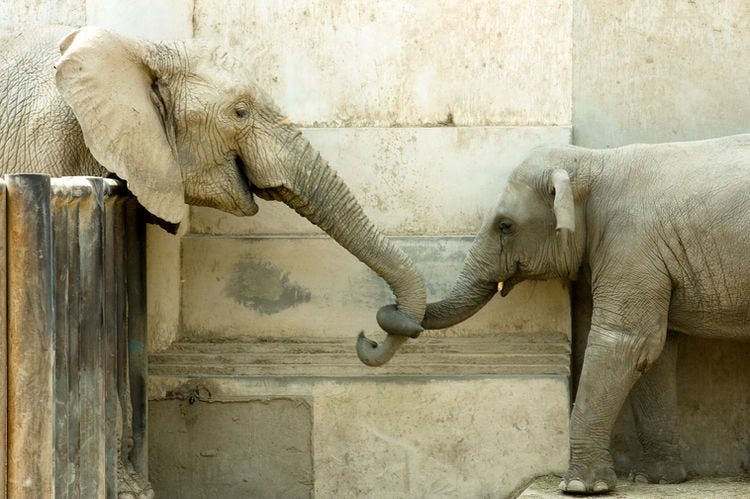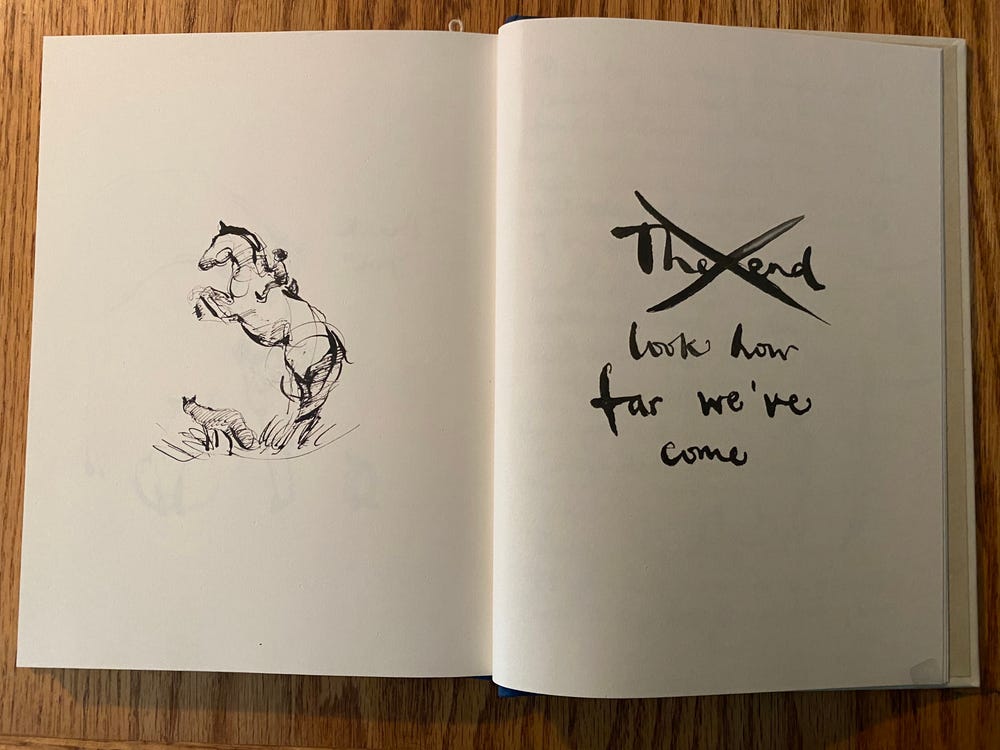Can you heal grief by being a perfect stranger?
Perhaps random acts of kindness aren't so random
“We sometimes encounter people, even perfect strangers, who begin to interest us at first sight, somehow suddenly, all at once, before a word has been spoken.”
— Fyodor Dostoevski, novelist
Sometimes when you’re grieving or just feeling blue, your mind does this little dance called, “nothing matters.” It’s understandable. Someone you love, or several someones you love, have died or are otherwise missing in your life. So, who you are is fundamentally changed.
Parts of you are missing—maybe even the sense that your life has meaning and purpose. Have you ever felt that way?
Can we talk about not-so-random acts of kindness? Bear with me. (I love that phrase, always imagining a little bear beside me.)
Recently I was Zoom-meeting with a new and energizing person in my world. Our conversation drifted into the concept of random acts of kindness. She shared a story of being a kid in the backseat of her family’s station wagon at a toll booth on the Pennsylvania turnpike. She watched her father pay the toll for the car behind them. She remembered the sounds of the coins clinking into the little toll slot, then her father looking over his shoulder, waving wildly and motioning to the unknown driver that he’d just paid their toll.
“I was puzzled, wondering why he did that, “ she said, “but if you saw how happy my dad was, his huge grin, and the surprised look on the face of that driver, well, you just knew it was a good thing.” Now she regularly pays for someone else’s coffee at the local Starbucks. “It’s an inconsequential thing,” she explained, “but it feels right.”
Is any kind act really inconsequential? No. They and we matter.
We’ve come to think of these moments as “random acts of kindness.” The phrase was coined by writer/journalist Anne Herbert, written as “practice random acts of kindness and senseless acts of beauty” on a restaurant placemat in 1982. It was her response, her antidote, to the constant reporting in the news of “random acts of violence and senseless acts of cruelty.”
One of my favorite books that found me in 2020 that speaks so beautifully and simply to the idea of kindness, to others and to yourself, is The Boy, the Mole, the Fox, and the Horse by Charlie Mackesy. (It’s one of the self-care resources I’ve listed on my website—click the button at the bottom of this post to explore what's there so far.)
One of the big questions the boy asks is, “What do we do when our hearts hurt?” Among the answers, after acknowledging the need for “tears and time,” the horse offers this: “Always remember you matter, you’re important and you are loved, and you bring to this world things no one else can.”
Talking with my new friend, we swapped stories about the power of saying something supportive to another soul, or ourselves being the recipient of a kind comment. Such gestures can lift one’s spirits in unexpected and unexplainable ways. Who knows what was going on in the life of that anonymous driver as he accepted the free toll and merged into traffic that long-ago day. For at least a brief while, wasn’t his world a little more promising?
We agreed that maybe, just maybe, when we focus kindness toward others it’s not random at all. Whether you’re the actor or the receiver of that impulse to be kind, you were in the right place at the right time. Your life and someone else’s intersected, and like a drop in a pond, the wave spreads out beyond what the eye can see.
Here’s the point to remember: every day you exist in the world, your life rubs up against others. You touch, literally or figuratively, your immediate circle of family and friends as well as an ever-changing assortment of strangers. There’s the little girl, fidgeting and pleading to her father, wanting a candy bar behind you as you buy groceries. That elbow, competing for the armrest on the airplane, is attached to someone, some other person dealing with who knows what on their way to who knows where.
They enter your awareness and are part of one moment in your life. And you, yes, you impact people, entering their lives in ways you’ll never know. Think about that.
Can you recall a time when someone unknown to you did or said something that made you smile or transformed a difficult mood in your day? I can—many times. In fact, later the same day that I had that friendly chat, my afternoon went terribly sideways, and it was a perfect stranger’s words that redeemed the remainder of my day.
Hmmmmm, perfect stranger? Where did that phrase come from? While perfection doesn’t exist, “perfect stranger” is a great way to think about that unknown person who sees you in all your human-being-ness and shows you a little love.
Guess what? You are a perfect stranger. You have already been and you remain a force for good. You have a unique kindness fingerprint. That is, only you can do and say what you do and say. Mackesy’s horse knows what he’s talking about.
It’s not hyperbole, it’s not hokey or naive, to remind yourself that the world needs you. Even—perhaps especially—if the weight of your losses keeps trying to pull you into that “nothing matters” mind dance, you are the perfect stranger to shift a moment in someone’s life toward joy. Oh, and by doing so, you shift you toward joy, too.
So here’s a subtly helpful grief healing practice to try.
It’s easy and can take literally less than a minute. Aim a kind word or gesture toward a person that you know or don’t know. See what happens. How do you feel immediately afterward? How does the recipient seem to feel? I’d love to hear what you did or said, and if you felt anything shift inside of you, at least a little bit. Just comment below or shoot me an email, if you're up to it.
In that short, sweet book of the boy and his wise animal companions, kindness is key to overcoming self-judgement, which is such a big shadow in the aftermath of a death. “What do you think is the biggest waste of time?” the boy wonders, and the mole replies, “to compare yourself to others.” We do that when we’re struggling with sorrow, don’t we? We wonder if we’re doing grief right and if we love who we loved well enough.
The book reminds us to never underestimate the value of our love and the small, sometimes seemingly tiny, steps we take forward.
My hope for you is that while you’ve experienced a life-changing ending, don’t overlook the fact that you’re still here. Look at your one-and-only face in the mirror each evening and whisper, “look how far I’ve come.”





